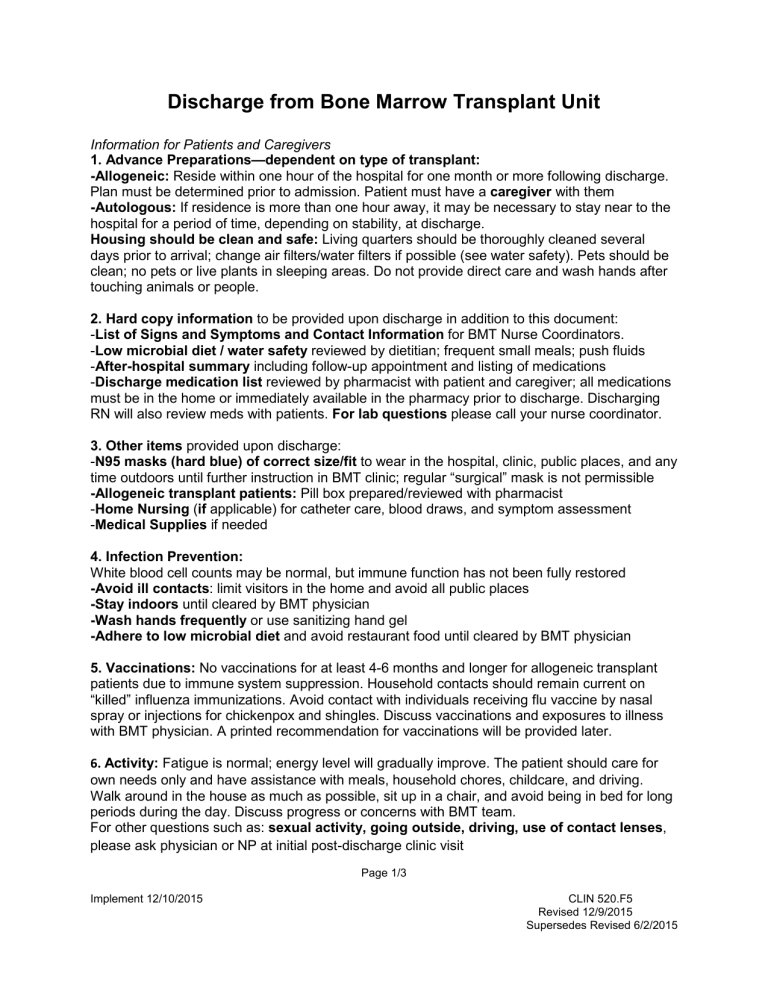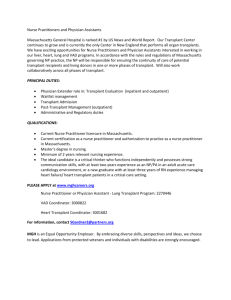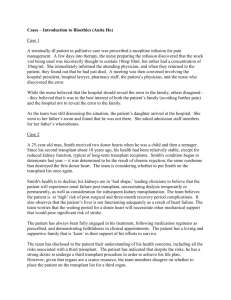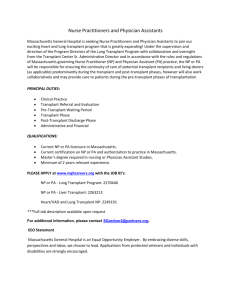Discharge from Bone Marrow Transplant Unit

Discharge from Bone Marrow Transplant Unit
Information for Patients and Caregivers
1. Advance Preparations—dependent on type of transplant:
-Allogeneic: Reside within one hour of the hospital for one month or more following discharge.
Plan must be determined prior to admission. Patient must have a caregiver with them
-Autologous: If residence is more than one hour away, it may be necessary to stay near to the hospital for a period of time, depending on stability, at discharge.
Housing should be clean and safe: Living quarters should be thoroughly cleaned several days prior to arrival; change air filters/water filters if possible (see water safety). Pets should be clean; no pets or live plants in sleeping areas. Do not provide direct care and wash hands after touching animals or people.
2. Hard copy information to be provided upon discharge in addition to this document:
List of Signs and Symptoms and Contact Information for BMT Nurse Coordinators.
Low microbial diet / water safety reviewed by dietitian; frequent small meals; push fluids
After-hospital summary including follow-up appointment and listing of medications
Discharge medication list reviewed by pharmacist with patient and caregiver; all medications must be in the home or immediately available in the pharmacy prior to discharge. Discharging
RN will also review meds with patients. For lab questions please call your nurse coordinator.
3. Other items provided upon discharge:
N95 masks (hard blue) of correct size/fit to wear in the hospital, clinic, public places, and any time outdoors until further instruction in BMT clinic; regular “surgical” mask is not permissible
-Allogeneic transplant patients: Pill box prepared/reviewed with pharmacist
Home Nursing ( if applicable) for catheter care, blood draws, and symptom assessment
Medical Supplies if needed
4. Infection Prevention:
White blood cell counts may be normal, but immune function has not been fully restored
-Avoid ill contacts : limit visitors in the home and avoid all public places
-Stay indoors until cleared by BMT physician
-Wash hands frequently or use sanitizing hand gel
-Adhere to low microbial diet and avoid restaurant food until cleared by BMT physician
5. Vaccinations: No vaccinations for at least 4-6 months and longer for allogeneic transplant patients due to immune system suppression. Household contacts should remain current on
“killed” influenza immunizations. Avoid contact with individuals receiving flu vaccine by nasal spray or injections for chickenpox and shingles. Discuss vaccinations and exposures to illness with BMT physician. A printed recommendation for vaccinations will be provided later.
6.
Activity: Fatigue is normal; energy level will gradually improve. The patient should care for own needs only and have assistance with meals, household chores, childcare, and driving.
Walk around in the house as much as possible, sit up in a chair, and avoid being in bed for long periods during the day. Discuss progress or concerns with BMT team.
For other questions such as: sexual activity, going outside, driving, use of contact lenses , please ask physician or NP at initial post-discharge clinic visit
Implement 12/10/2015
Page 1/3
CLIN 520.F5
Revised 12/9/2015
Supersedes Revised 6/2/2015
Contact Information
1. Call your designated Transplant Nurse Coordinator during normal working hours,
Monday through Friday, from 8:00 am to 4:30 pm:
-Richard Banagale, RN 916-734-4302
-Grace Chan, RN 916-734-1049
-Catherine Cook, RN 916-734-8651
-Sara Lewis, RN 916-734-4198
Transplant Fax: 916-734-0631
For URGENT CALLS, proceed to #2-4 below and DO NOT ONLY LEAVE A VOICEMAIL ,
If call is not urgent, and RN is not at the desk, please leave a detailed voicemail and expect a return call that day for business hour messages.
See “ Signs and Symptoms to Report ” .
2. Call the UCDMC operator during nights, weekends, and holidays . Indicate you are a transplant patient and ask for “Bone Marrow Transplant Physician On Call” .
UCDMC Hospital Operator 916-734-2011
3. If you do not receive a call back when contacting the physician through the hospital operator, you may contact the Bone Marrow Transplant Unit and ask for the
Charge Nurse. The Charge Nurse will facilitate communication between you and the physician on call.
BMT / Oncology Unit 916-703-3080
4. Please dial 9-1-1 if you experience a medical emergency. Identify yourself as a bone marrow transplant patient. Encourage the emergency department staff to contact the UCD
Transplant physician on call as noted above
5. Please contact your pharmacy directly for any medications with “refills remaining” .
Contact the pharmacy several days in advance to avoid unforeseen delays. Call your nurse coordinator with questions or concerns.
6. If you have been released from the transplant program and have returned to follow up with your primary Oncologist, please contact your Oncologist for assistance initially.
7.
SHOULD BLOOD TRANSFUSION BE NEEDED, BLOOD MUST BE IRRADIATED!
Implement 12/10/2015
Page 2/3
CLIN 520.F5
Revised 12/9/2015
Supersedes Revised 6/2/2015
Examples of SIGNS AND SYMPTOMS TO REPORT
*FEVERS AND CHILLS: Temperatures greater than 100.5F, or lower temperatures that persist, especially if accompanied by chills.
PERSISTENT COUGH Note any characteristics such as sputum production and color, frequency, and any associated pain.
* SHORTNESS OF BREATH If even mild activity causes you to have trouble breathing or you are excessively fatigued, dizzy or light-headed.
*BLEEDING Any bleeding whatsoever should be reported. This includes blood in the urine or stool, bleeding from the nose or gums or petechiae or bruising on the skin.
NAUSEA OR VOMITING Take the anti-nausea medications as directed. Do not go beyond
24 hours with an upset stomach. CALL if you are unable to take fluids because of the nausea.
And about fluids, need to drink enough fluid (water, tea, broth, juice) to keep your urine a light color.
DIARRHEA if you are having watery stools, multiple bloody or black tarry stools, or if you have significant abdominal pain associated with diarrhea, you should report it. This is particularly important for patients having allogeneic transplants since diarrhea can be a sign of graft versus host disease.
SKIN RASH A rash can be caused by medication allergy, certain viral infections, or graft versus host disease (in allogeneic transplantation). A painful rash with blisters could be herpes zoster (“shingles”). Any significant rash should be reported. * If the rash is rapidly worsening or painful this should be reported promptly, even if it is on the weekend.
PAIN Take pain medication as directed. Any changes in the pain, such as location, intensity or duration, as well as new pain, should be reported.
ELIMINATION Constipation or diarrhea (see above) should be reported, as well as changes in urination such as urgency, frequency, burning or pain.
CATHETER PROBLEMS Any changes in the venous catheter site such as redness, pain, swelling or drainage should be reported, as well as problems with catheter function.
* Significant redness, tenderness, swelling or lack of function should be reported immediately.
_____________________________
Bold items with * indicate symptoms that should be reported to the physician if it is after hours or on the weekend when you will not be able to report these serious symptoms to the Nurse
Implement 12/10/2015
Page 3/3
CLIN 520.F5
Revised 12/9/2015
Supersedes Revised 6/2/2015


